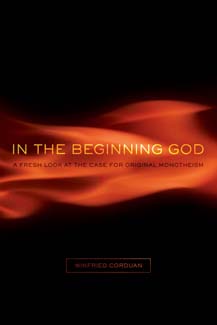About the Author
Winfried Corduan is professor emeritus of Philosophy and Religion at Taylor University in Upland, Indiana.
Introduction
Throughout the 19th Century the majority of scholars who studied the development of religion believed that monotheistic beliefs emerged quite late in time. They thought that the earliest human cultures were animistic. From primitive animism arose polytheism which in some cultures further evolved into monotheism. As ethnologists and historians of religion and culture continued to investigate the original religious beliefs of human societies, however, some dissenting scholarly voices began to argue that the evidence pointed to monotheistic belief being the earliest form of religious belief amongst human beings.
In this book Winfried Corduan traces the story of the debate and brings it forward into the 20th Century. He presents fresh argumentation that the minority scholarly opinion—championed most effectively by Wilhelm Schmidt—is more plausible than the mainstream consensus. Corduan finds that the field of scholarship that opposes original monotheism does so on the basis of naturalistic, philosophical presuppositions and theories, rather than on actual historical data and field reports. The book contains many examples and reports of people groups and their beliefs in order to demonstrate that the thesis of original monotheism is not asserted apart from the actual evidence of ethnography. The most plausible way to account for the distribution and earliness of monotheistic belief is on the basis of its being true: one God has revealed himself to the human race. This latter conclusion is drawn with appropriate scholarly tentativeness and is not forced by previous religious bias. Careful consideration of the findings of ethnography, however, does lend support to monotheistic religion.
Table of Contents
Preface
Chapter 1 Origins and Beginnings: Confusion in the Making
Chapter 2 Max Müller: Mythology as a Disease of Language
Chapter 3 E. B. Tylor: Religion from a Darwinian Perspective
Chapter 4 Andrew Lang: Turnabout is Fair Play
Chapter 5 Andrew Lang: Interactions and Totemism
Chapter 6 Wilhelm Schmidt and Culture Circles
Chapter 7 Wilhelm Schmidt: The Results
Chapter 8 Wilhelm Schmidt: Reactions and Critiques
Chapter 9 Eliade, Otto, and Durkheim: Escape into the Irrational
Chapter 10 Monotheism Around the Globe
Chapter 11 Original Monotheism and Christian Apologetics
Appendix A
Appendix B
Summary
Chapter 1 Origins and Beginnings: Confusion in the Making
The story followed in this book concerns scholars—particularly in the 19th and 20th Centuries—who tried to find out how religion came about. Many of the theories put forward were dogmatic, contradictory, and lacking evidential support, and data was forced to fit into preconceived theses. Some of the best answers that consisted of plausible conclusions drawn from actual historical and ethnographic evidence were rejected. Their rejection was not on the basis of scholarly research and refutation, but rather on the basis of naturalistic bias. This study demonstrates that some of those answers have still not been given a fair hearing, and they are still valid today. . . .
[To continue reading this summary, please see below....]The remainder of this article is premium content. Become a member to continue reading.
Already have an account? Sign In
